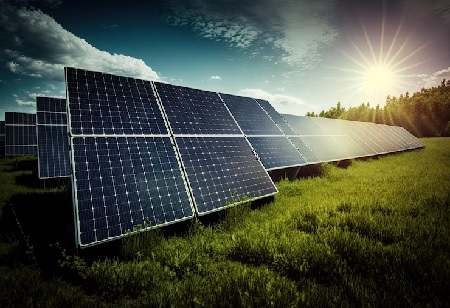
India's Decade of Power Growth Fuels Big Renewable Energy Plans

 According to Union Minister R K Singh in the Lok Sabha, India has made substantial progress in its power generation capacity, witnessing a remarkable 70% increase between 2014 and 2023. Transitioning from a power deficit to surplus, the nation has added 97,501.2 MW in conventional power and 96,282.9 MW in renewable energy over the past decade. As of October 2023, India's total generation capacity stands at 425,536 MW, a significant rise from 248,554 MW in March 2014. Additionally, the country has expanded its transmission infrastructure by 187,849 circuit kilometers in the last nine years, facilitating the transfer of 116,540 MW of power across the nation.
According to Union Minister R K Singh in the Lok Sabha, India has made substantial progress in its power generation capacity, witnessing a remarkable 70% increase between 2014 and 2023. Transitioning from a power deficit to surplus, the nation has added 97,501.2 MW in conventional power and 96,282.9 MW in renewable energy over the past decade. As of October 2023, India's total generation capacity stands at 425,536 MW, a significant rise from 248,554 MW in March 2014. Additionally, the country has expanded its transmission infrastructure by 187,849 circuit kilometers in the last nine years, facilitating the transfer of 116,540 MW of power across the nation.
Enhancements in the distribution network have been evident through the execution of projects valued at 1.85 lakh crore as part of various governmental initiatives. This effort has led to the establishment of 2,927 substations and an increase of 8.86 lakh circuit kilometers in HT/LT lines. Consequently, rural areas now experience extended power availability, rising from 12 hours in 2015 to 20.6 hours in 2023, while urban regions enjoy 23.6 hours of power supply. The Minister highlighted a significant reduction in the gap between energy demand and supply, which decreased from 4.2% in the fiscal year 2013-14 to a mere 0.3% in 2023-24. However, the remaining deficit is linked to constraints in state transmission networks and distribution systems, along with financial challenges faced by DISCOMs. The surge in power demand in India has been driven by the nation's swift economic growth and the provision of electricity to 2.86 crore households.
Looking ahead, the Ministry of Power has outlined an extensive strategy to meet the projected surge in power requirements. Ongoing projects encompass 27,180 MW in thermal capacity, 18,033.5 MW in hydro capacity, 8,000 MW in nuclear capacity, and 78,935 MW in renewable energy capacity. By 2031-32, India anticipates an additional capacity of 464,124 MW. Aligning with its commitment to boost non-fossil fuel-based electricity generation to surpass 500,000 MW by 2030, India is executing a phased transmission blueprint to integrate renewable energy. Initiatives include establishing ultra mega renewable energy parks and constructing green energy corridors, with 13 renewable energy management centers already operational.